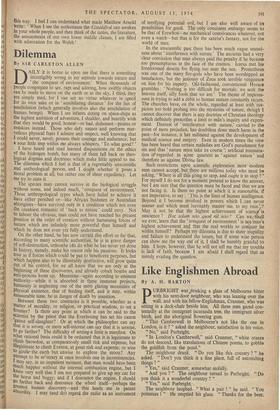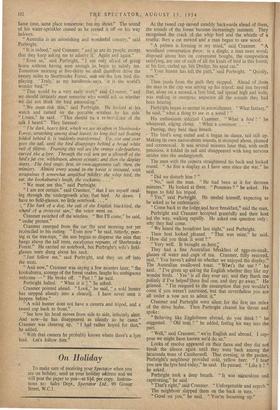Like Englishmen Abroad
By A. H. BARTON pURBRIGHT was.drinking a glass of Melbourne bitter with his next-door neighbour, who was leaning over the wall, and with his fellow-Englishman, Cranmer, who was sitting in a deck-chair beside him. All three men gazed con- tentedly at the immigrant jacaranda tree, the immigrant silver birch, and the aboriginal flowering gum.
" This' Camberwell in Melbourne's not like the one in London, is it ? " asked the neighbour, satisfaction in his voice. " No," said Purbright.
" In London's Camberwell," said Cranmer, " white cranes do not descend, like translations of Chinese poems, to gobble the goldfish from the pond." The neighbour drank. " Do you like this country ? " he asked. " Don't you think it a fine place, full of astonishing things ? " " Yes," said Cranmer, somewhat stolidly.
" And you ? " The neighbour turned to Purbright. " Do you think it a wonderful country ? " " Yes," said Purbright.
The neighbour laughed. " What a pair I " he said. " You pommies 1 " He emptied his glass. ' Thanks for the beer. Same time, same place tomorrow; but my shout." The sound of his water-sprinkler ceased as he turned it off on his way indoors.
" Australia is an astonishing and wonderful country," said Purbright.
" It is indeed," said Cranmer, " and so are its people, except that they keep asking me to admire it. Again and again." " Even so," said Purbright, " 1 am only afraid of going home without having seen enough to begin to satisfy me. Tomorrow morning at five-thirty we shall therefore drive the twenty miles to Sherbrooke Forest, and see the lyre bird dis- playing. Truly,' as my handbook says, it is the world's wonder bird.' " " That would he a very early start," said Crinmer, " and we should certainly meet someone who would ask us whether we did not think the bird astounding."
" We must risk thid," said Purbright. He looked at his watch and' turned on the portable wireless by his side. " Listen," he said. "'This should be a re-brcmlzast of the talk I heard." They listened:
" The dark, heavy bird, which we see so often in Sherbrooke Forest, scratching among dead leaves, its long dull tail floating folded behind it, is suddenly, transformed. Up, out and over goes the tail, until the bird disappears behind a broad white veil of filigree. Framing this veil are the orange s.'de-feathers, curved like a lyre. Through the veil you get a glimpsf of the bird's fat eye, withdrawn, almost ecstatic; and then the display starts. The bird sings: first, its own. aggressive call; then, the mimicry. Almost every sound in the forest is imitated, with scrupulous if somewhat amplified fidelity: the whip bird, the cat, the kookaburra's laugh, the cockatoo. . . ."
"We must see this," said Purbright.
" I am not certain," said Cranmer, " that I see myself steal- ing through the undergrowth after, that bird. At dawn. I have no field-glasses, no little notebook.... "
The bark of a dog, the call of the English blackbird, the sound of a cross-cut saw," the voice went on.
Cranmer switched off the wireless. " But I'll come," he said, " under protest."
Cranmer emerged from the car the next morning not yet reconciled to his outing. " Even now " he said, bitterly, peer- ing at the tree-tops, " the sun begins to disperse the mist that hangs above the tall trees, eucalyptus regnans, of Sherbrooke Forest." He carried no notebook, but Purbright's wife's field.- glasses were slung about his neck.
" Just follow me," said Purbright, and they set off into the trees.
" And now," Cranmer was saying a few minutes later, " the kookaburra, scourge of the forest snakes, laughs his ambiguous welcome — " He broke off. " Psst ! " he said.
Purbright halted. " What is it '?.," he asked.
Cranmer pointed ahead. " Look," he said, " a wild hunter has stepped silently into a clearing. I have never seen it happen before."
A wild hunter does not have a camera and tripod, and a tweed cap back to front."
" See how his head moves from side to side, infinitely alert. And now—he has disappeared as silently as he came." Cranmer was cheering up. " I had rather hoped for that," he added.
" With that camera he probably knows where there's a lyre bird. Let's follow him." As the tweed cap moved steadily backwards ahead of them, the sounds of the forest became increasingly insistent. They recognised the crack of the whip bird and the whistle of a rosella; then a cat mewed and a man began to saw wood.
" A picture is forming in my mind," said Cranmer. " A woodland conversation piece: in a dingle, a man saws wood; disposed about him on convenient boughs, the composition satisfying, are one of each of all the kinds of bird in this forest; at his feet, curled up, lies Dredge, his aged cat."
" Your hunter has left the path," said Purbright. " Quietly, now."
Then yards from the path they stopped. Ahead of them the man in the cap was setting up his tripod; and just beyond that, alone on a mound, a lyre bird, tail spread high and wide, was making in energetic sequence all the sounds they had been hearing.
Purbright began to mutter in astonishment. " What fantasy," he said, " what a thing to see in a wood ! "
His enthusiasm infected Cranmer. " What a bird ! " he whispered, edging closer. " What a continent. . . ."
Peering, they held their breath.
- The bird's song ended and it began its dance, tail still up. Making its own native-drum sounds, it stomped about, plumed and ceremonial. It was several minutes later that, with swift precision, it folded its tail and disappeared with long nervous strides into the undergrowth.
The man with the camera straightened his back and looked round. " As fine a display as I have seen since the war," he said.
" Did we disturb him ?
" No," said the man. " He had been at it for thirteen minutes." He looked at them. " Pommies ? " he asked. He began to fold his tripod.
" Yes," said Purbright. He steeled himself, expecting to be asked to be enthusiastic.
" Come back to the lodge and have breakfast," said the man.
Purbright and Cranmer ccepted gratefully and their host led the way, walking rapidly. He asked one question only : why they had come.
" We heard the broadcast last night," said Purbright.
Their host looked pleased. " That was mine," he said. " How did you think it went ? "
" Very well. It brought us .here.2 They had a fine Australian breakfast of eggs-on-steak, glasses of water and cups of tea. Cranmer, fully restored, said, " You haven't asked us whether we enjoyed the display." The Australian swallowed toast. " WI-At's the use ? " he said. " I've given up asking the English whether they like my wonder birds. Yes is all they ever say, and they thank mo politely if I've helped them find one, and they go away." He grinned. " I'm resigned to the assumption that you wouldn't come if you weren't interested, but that nevertheless you are all under a vow not to admit it."
Cranmer and Purbright were silent for the first ten miles of the drive ham. Then Purbright cleared his throat and spoke: " Behaving like Englishmen abroad, do you think ? " he suggested. " Old man ? " he added, feeling his way into the part.
" Well," said Cranmer, " we're English and abroad. I sup- pose we might have known we'd do so."
Looks of resolve appeared on their faces and they did not break the silence again until they were back among the jacaranda trees of Camberwell. That evening, in the garden, Purbright's neighbour provided cold, yellow beer. I hear you saw the lyre bird today," he said. He paused. " Like it ? " he asked.
Purbright took a deep breath. " It was miraculous and captivating," he said.



































 Previous page
Previous page